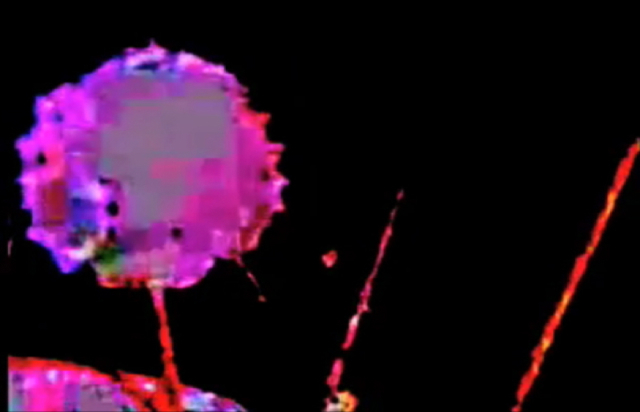
Leonardo Abstract Services (LABS) 2010-2011
MINDtouch – Ephemeral Transference: ‘Liveness’ in Networked Performance with Mobile Devices
This practice-based thesis investigates the four key qualities of ‘liveness’, ‘feltness’, ‘embodiment’ and ‘presence’ in mobile media performance, in order to shed light on the use qualities and sensations that emerge when mobile technologies are used in tandem with wearable devices in performance contexts. The research explores mobile media as a non-verbal and visual communication tool that functions by repurposing the mobile phone device and its connection to a wireless network, not only for communication but explicitly for the expression of ‘emotion’ in the form of a video file representing an interpersonal connection shared over distance. The research aims to identify and supplement existing scholarly discourse on the nature of these four key strands of kinaesthetic philosophy made ‘live’ in the online network, applying knowledge gained through the practice of enhancing participant experience of the use of simple ubiquitous mobile tools with bespoke biofeedback sensors and an online repository for the playback of users’ visual expressions. This enhanced toolkit enables participants to share personal relationships and social interactions in an immediate way, with collaborators at a distance. The selected methodology of active research using kinaesthetic tools in live performance seeks to identify and clarify new ways of simulating or emulating a non-verbal, visual exchange within a social participatory context, with particular attention paid to a sense of ‘feltness’ as an element of ‘presence’ or ‘liveness’, and with attention to the experience of a sense of ‘co-presence’ arising in real-time collaborative mobile performances at a distance.
To best explore these concepts as well as the bodily sensations involved for participants, the thesis analyses original data gleaned from a larger R&D project (conducted in tandem with this thesis project, sponsored by the BBC) as its major case study. The project, called MINDtouch, created a series of unique practice-based new media performance events played out in real-time networked contexts. The MINDtouch events were framed as a means for participants to simulate dream exchange or telepathic thought transfer using mobile phones and biofeedback devices, linked to a bespoke video file protocol for archiving and sharing visual results. The corporeal, non-verbal forms of communication and visual interaction observed when participants use such devices within participatory performance events is examined by way of demonstrating the impact of specific live encounters and experiences of users in this emerging playing field between real-time and asynchronous, live and technologised forms expressing liveness/presence/distance. The thesis benefits from access to the larger MINDtouch project and its original data, providing this research with a set of process-based evidence files both in video and transcript form (contained in the thesis appendices). By analysing this unique data set and applying the theoretical contexts of kinaesthetic philosophies where appropriate, the thesis demonstrates both the practical and the critical/contextual effectiveness of the media facilitation process for the participants, and shares their senses of ‘liveness’ and ‘presence’ (of themselves and of others) when using technology to externalise visual expressions of internalised experiences.
This thesis makes an original contribution to scholarship in the fields of Performance and New Media, with additional contributions to the cognate fields of Philosophy and Technology, and locates its arguments at the locus of the fields of Performance Art, Mobile Performance/Locative Media, Philosophies of the Body and Communications. The thesis uses methods, practices and tools from Phenomenology, Ethnography, Practice-As-Research, and Experience Design, bringing together the relevant aspects of these diverging areas of new media research and media art/performance practices. The research demonstrates that there is a need for new technological tools to express viscerally felt emotion and to communicate more directly. It is hoped that this study will be of use to future scholars in the arts and technology, and also that it may help to demonstrate a way of communicating rich emotion through felt and embodied interactions shared with others across vast distances (thus supporting political movements aimed at reducing global travel in the age of global warming).
Degree: PhD Digital Media
Year: 2010
Pages: 210 without Appendices, 360 with Appendices
University: SMARTlab Digital Media Institute (University of East London awarding university)
Supervisor: Professor Lizbeth Goodman
Semail: lizbeth.goodman@ucd.ie
Supervisor 2: Dr. Sher Doruff, Dr. Ryya Bread, Dr. Marc Price
Language: English
Dept: Digital Media
Copyright: Camille C. Baker
Lang_author: English
Url: www.swampgirl67.net
Email: camille@swampgirl67.net
Keywords: mobile media performance, phenomenology, telematics, mobile art, performance and technology
LEONARDO ABSTRACTS SERVICE (LABS) is a comprehensive collection of Ph.D., Masters and MFA thesis abstracts on topics in the emerging intersection between art, science and technology.
If you are interested you can submit your abstract to the English LABS, Spanish LABS, Chinese LABS and French LABS international Peer Review Panels for inclusion in their respective databases. The authors of abstracts most highly ranked by the panel will also be invited to submit an article for consideration for publication in the refereed journal Leonardo.
